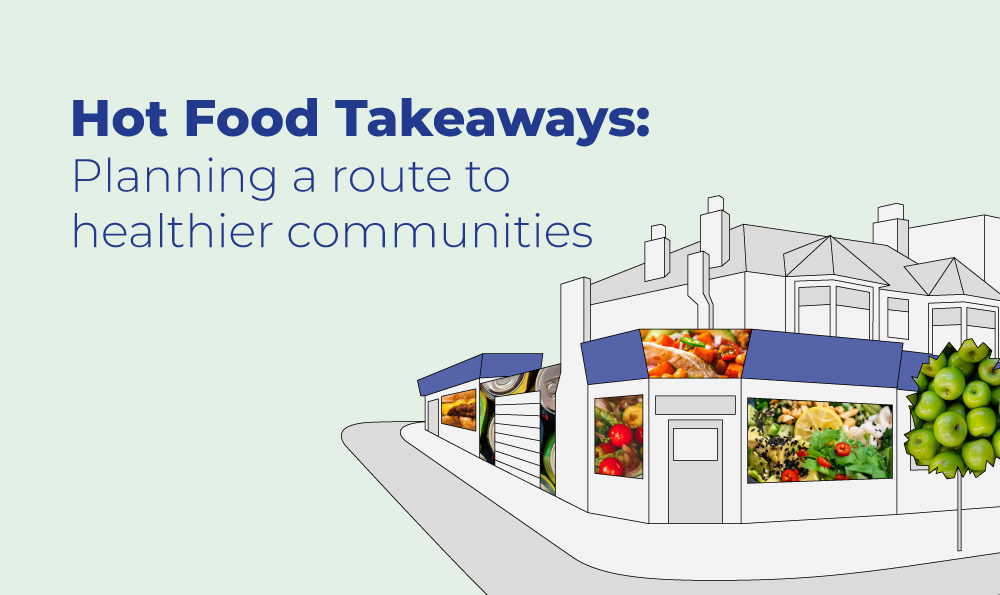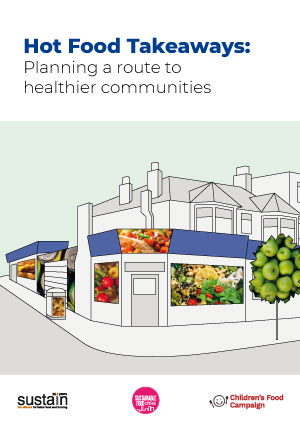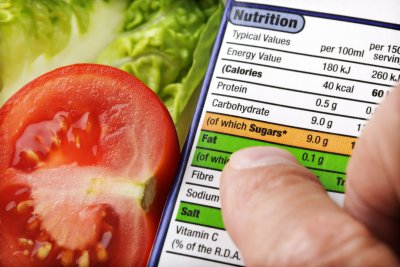

Government urged to step in as new wave of junk food set to hit the high street
Sustain's new report published as fast food giants McDonalds and KFC are eyeing up 800 new UK sites, in aggressive expansion plan. The charity warns local planning policies to combat obesity are already under attack. Existing policies still don’t go far enough in tackling child obesity, and report recommends next Government explores options such as restricting sales of unhealthy food to children on school run.
Sustain [2] who produced the report, Hot Food Takeaways: Planning a route to healthier communities, call on the next Government to require planning policies to restrict new hot food takeaways near schools, following evidence from some local authorities that even the limited powers they have are being eroded.
Sustain’s analysis found that McDonalds and KFC are allocating millions of pounds on expansion plans, in stark contrast to Government ambitions to halve child obesity by 2030.[1]
With approximately 70,000 takeaways across Britain [3], and hot food takeaways tending to provide more unhealthy food, the authors argue that planning tools alone can only go so far and that the next Government must look into more radical options to improve the healthiness of what is on offer if it is serious about tackling child obesity [4].
Ben Reynolds, Deputy Chief Executive of Sustain who produced the report,
“Planning policies to restrict new hot food takeaways near schools are one of the few concrete ways Local Authorities have to stop their areas becoming even more saturated with unhealthy food. Yet even these tools are coming under attack, with local authorities lacking capacity to provide adequate evidence to stand up to the resources of multinational chains. Unlike Government’s aims to halve child obesity - it’s almost as if these businesses want to double child obesity by 2030.”
“We recommend that the next Government gives local authorities more powers to decide what happens in their localities. Current planning policies only focus on new takeaways near schools. If we are serious about tackling child obesity, we should also be looking at existing takeaways and other outlets selling unhealthy food to kids around school hours.”
Kieron Boyle, CEO at Guy’s and St Thomas’ Charity commented:
“Across the UK, young people are growing up in places saturated with cheap, unhealthy food. Our work in South London tells us that unhealthy takeaways are concentrated in lower-income neighbourhoods; that children go to them primarily as a place to socialise; and that many aggressively market ‘school kids’ discounts. This excellent report from Sustain sets out case studies from across the UK with practical examples of what can be done to tackle this problem. It also puts a spotlight on some of the commercial interests using arguments reminiscent of those from ‘Big Tobacco’ to maintain the unhealthy status quo.”
Central Government recommends using planning policies to control access to unhealthy food are adopted by local Councils [5], yet some are being withdrawn under pressure from objections by takeaways chains, and many more now fear the financial implications of pursuing these policies.[6]
Paul Seddon, Director of Planning & Regeneration at Nottingham City Council said:
“In Nottingham, we are aware of the knock-on effect child obesity can have on health in later life. With more than 350 takeaways in the city, we wanted to include a policy in our emerging local plan to control new applications for fast-food outlets that were within 400m of a school.
“Our policy was challenged by two major fast food chains and the planning inspector decided that there was insufficient ‘locally-specific evidence’ to keep it. This is one less tool we have to try and combat childhood obesity”.
Despite such pressure, Sustain’s report provides examples of those local authorities who have developed and preserved such planning policies, including Gateshead.
Cllr John McElroy, Cabinet Member for Environment and Transport at Gateshead Council said:
“A survey undertaken in 2013 of hot food takeaway meals concluded that food being sold in Gateshead was extremely unhealthy, and in many cases contained more saturated fat and calories recommended for an entire day. Unhealthy food is readily available in Gateshead, with more takeaways per 1000 population open compared to the national average along with high levels of obesity. In response to this, Gateshead Council decided to try and tackle this issue by creating planning policy that would restrict Hot Food Takeaways. Since we adopted our Hot Food Takeaway SPD in 2015 there has been an overall reduction in the number of hot food takeaways in Gateshead, creating healthier environments for our residents and visitors. The preparation of the SPD was a joint effort between Planning, Public Health and Environmental Health. Collaborative work, sharing of knowledge and expertise ensured that the SPD was trailblazing and successful and has even won awards.”
As well as providing a guide to what evidence local areas need to collect to support and defend planning policies to restrict new hot food takeaways, the report makes a series of recommendations on planning, design and licensing to tackle child obesity. These include:
- National Government support for local areas to increase the adoption of planning restrictions, and defend existing policies by critiquing evidence regularly submitted on behalf of fast food chains.
- Explore the impact of restrictions on the sale of unhealthy food to under 16s on school days, or within school run hours. Also explore the potential for a licence to sell unhealthy food outside of these opening hours. A poll by RSPH showed 55% of public support introducing a licence [7]. Both would encourage businesses to reformulate their offer, or contribute to local authorities’ capacity to provide this support.
- Reviewing residential space standards to ensure houses have sufficient space for food preparation, cooking, dining and storage.
Ends
Press enquiries please call Ben Reynolds on 07939 202 711 or ben@sustainweb.org
 Download the report
Download the report
Hot Food Takeaways: Planning a route to healthier communities
Notes
1. McDonalds are looking to open 300 new premises over the next 10 years, and KFC are looking for 500 new sites. Both organisations are offering £20,000 for introductions for sites.
https://www.kfc.co.uk/development/developments-at-kfc
https://www.mcdonalds.com/gb/en-gb/new-sites.html
2. Sustain is the alliance for better food and farming. Sustain advocates food and agriculture policies and practices that enhance the health and welfare of people and animals, improve the working and living environment, enrich society and culture and promote equity. We represent around 100 national public interest organisations working at international, national, regional and local level. We work with our members and others to promote integrated healthy and sustainable policies and practices for food, farming and fishing. Sustain works on a number of projects across the UK which have informed our position on hot food takeaways, including Sustainable Food Cities, Planning Food Cities, Sugar Smart and the Children’s Food Campaign.
3. The number of fast food shops within 400m of schools (approximately a 5 minute walk) is increasing in England, according to data from Cambridge University’s Centre for Diet and Activity Research (CEDAR), and is particularly high in London boroughs. https://www.cedar.iph.cam.ac.uk/feat-launch/
- More than 400 schools across England have 20 or more fast food takeaways within a 400-metre radius
- While a further 1,400 have between 10 and 19 outlets within the same distance.
- In June 2014 the average English school had 2.3 takeaways within 400 metres. By September 2017 it had risen to 2.6.
- Schools in London have an average of six fast food shops within a 5 minute walk of the gates, with this figure rising to eight or more in some of the poorest areas.
- Data from June 2018 showed just under 70,000 takeaways across England (59,456), Wales (3269) and Scotland (6506). This shows a rise in England from 52,476 in June 2014.
Across England as a whole, areas in the poorest decile play home to a density of fast food outlets five times higher than areas in the richest decile, according to PHE Data. https://assets.publishing.service.gov.uk/government/uploads/system/uploads/attachment_data/file/741555/Fast_Food_map.pdf
4. Obesity or overweight affects 22.6% of children entering primary schools, rising to one in three 10-11 year old children when they leave. This prevalence is doubled for children from disadvantaged and most deprived areas of the country. National Child Measurement Programme - NHS Digital (October 2019) https://digital.nhs.uk/data-and-information/publications/statistical/national-child-measurement-programme/2018-19-school-year/age
Children with obesity are over five times more likely to have obesity as adults. Simmonds M et al. (2016) Predicting adult obesity from childhood obesity: a systematic review and metaanalysis. Obesity Reviews.
5. National Planning Policy Framework https://www.gov.uk/government/collections/revised-national-planning-policy-framework (Para 91) and https://www.gov.uk/guidance/health-and-wellbeing (Paragraph: 004 Reference ID:53-004-20190722 Revision date: 22 07 2019)
6. Policies were deleted this year after the Examination of the Nottingham Local Plan Part 2 heard objections from KFC and McDonalds (https://www.nottinghamcity.gov.uk/information-for-business/planning-and-building-control/planning-policy/the-local-plan-and-planning-policy/lapp-local-plan-part-2-examination/matters-issues-and-questions/ See matter 6). Similarly, Haringey Council’s Development Management policy was removed following the examination in 2017 https://www.haringey.gov.uk/sites/haringeygovuk/files/haringey_final_inspector_report_28_april_2017.pdf
7. The Royal Society of Public Health (RSPH) commissioned a public poll of a 2,000 sample size, UK-representative, through Populus. One of the questions was on Exploration of novel licensing tools as a means to reduce after-school consumption of food at unhealthy fast food restaurants. The results included:
a. 55% support “food outlets to have to apply for a licence in order to be able to sell unhealthy fast food” (no significant splits)
b. 59% support a fee going to council from all new unhealthy fast food outlets, set aside for physical activity programmes for young people.
Planning Food Cities: Shaping the future of local areas to create a more sustainable and local food system.
Sustain
The Green House
244-254 Cambridge Heath Road
London E2 9DA
020 3559 6777
sustain@sustainweb.org
Sustain advocates food and agriculture policies and practices that enhance the health and welfare of people and animals, improve the working and living environment, promote equity and enrich society and culture.
© Sustain 2026
Registered charity (no. 1018643)
Data privacy & cookies
Icons by Icons8







